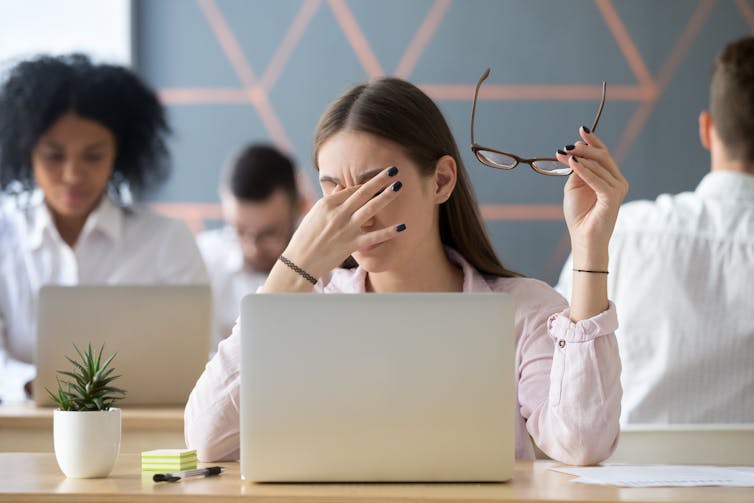Blue light isn't the main source of eye fatigue and sleep loss – it's your computer
- Written by Phillip Yuhas, Assistant Professor of Optometry, The Ohio State University
Blue light has gotten a bad rap, getting blamed for loss of sleep and eye damage[1]. Personal electronic devices emit more blue light than any other color[2]. Blue light has a short wavelength, which means that it is high-energy and can damage the delicate tissues of the eye. It can also pass through the eye to the retina, the collection of neurons that converts light into the signals that are the foundation of sight.
Laboratory studies have shown that prolonged exposure to high-intensity blue light damages retinal cells[3] in mice. But, epidemiological studies on real people[4] tell a different story.
As an assistant professor at The Ohio State University[5] College of Optometry, I teach and conduct vision research, including work with retinal eye cells. I also see patients in the college’s teaching clinics. Often, my patients want to know how they can keep their eyes healthy despite looking at a computer screen all day. They often ask about “blue-blocking” spectacle lenses that they see advertised on the internet.
But when it comes to protecting your vision and keeping your eyes healthy, blue light isn’t your biggest concern.
Built-in protection
 Sunlight has more blue light than your computer.
miamgesphotography/Shutterstock.com[6]
Sunlight has more blue light than your computer.
miamgesphotography/Shutterstock.com[6]
One way to think about blue light and potential retinal damage is to consider the Sun. Sunlight[7] is mostly blue light. On a sunny afternoon, it’s nearly 100,000 times brighter[8] than your computer screen. Yet, few human studies have found any link[9] between sunlight exposure and the development of age-related macular degeneration, a retinal disease that leads to loss of central vision.
If being outside on a sunny afternoon likely doesn’t damage the human retina, then neither can your dim-by-comparison tablet. A theoretical study recently reached the same conclusion[10].
So, why the disconnect between blue light’s effects on rodent eyes and human eyes?
Human eyes are different than rodent eyes. We have protective elements, such as macular pigments[11] and the natural blue-blocking ability of the crystalline lens[12]. These structures absorb blue light before it reaches the delicate retina.
That doesn’t mean you should throw away those sunglasses; they provide benefits beyond protecting your eyes from the Sun’s blue light. For example, wearing sunglasses slows down the development of cataracts[13], which cloud vision.
Feeling the blues
Just because blue light isn’t harming your retina doesn’t mean your electronic devices are harmless, or that blue light doesn’t affect your eyes. Because of its wavelength, blue light does disrupt healthy sleep physiology[14]. Blue-light-sensitive[15] cells, known as known as intrinsically photosensitive retinal ganglion cells, or ipRGCs, play a key role here, because they tell the brain’s master clock how light it is in the environment. That means, when you look at a brightly lit screen, these cells help set your internal clock for daytime-level alertness.
But these cells are sensitive to colors beyond blue because they also receive input from other retinal neurons[16] that are sensitive to the entire color spectrum.
Therefore, eliminating blue light alone doesn’t cut it when it comes to improving sleep; you need to dim all colors.
As for your tired eyes after a long day spent staring at your computer – another common complaint I hear from my patients – blue light isn’t solely to blame for that, either. A recent study demonstrated that cutting blue light alone did not improve[17] people’s reported comfort after a long computer session any more than simply dimming the screen.
Does blocking the blue make sense?
Many patients want to know if they should buy certain products they have seen advertised to block out blue light. Based on research, the short answer is “no.”
First, the truth is that any bright light too close to bedtime interferes with sleep.
Mounting evidence[18] suggests that, compared to reading a paperback, screen time before bed increases the time it takes to fall asleep. It also robs you of restorative rapid-eye-movement sleep, dulls focus and diminishes brain activity the next day. Holding your phone close to your eyes with the lights on likely exacerbates the problem[19].
Second, the products that my patients ask about do not block out much blue light. The leading blue-blocking anti-reflective coating, for example, blocks only about 15%[20] of the blue light that screens emit.
You could get the same reduction just by holding your phone another inch from your face. Try it now and see if you notice a difference. No? Then it shouldn’t surprise you that a recent meta-analysis concluded that blue-blocking lenses and coatings have no significant effect[21] on sleep quality, comfort at the computer, or retinal health.
What really works
 Computers cause eye strain because people don’t blink as often when staring at a screen.
fizkes/Shutterstock.com[22]
Computers cause eye strain because people don’t blink as often when staring at a screen.
fizkes/Shutterstock.com[22]
There are ways to make your screen viewing more comfortable and more conducive to sleep.
First, turn off your electronic devices before bed. The American Academy of Pediatrics[23] recommends that bedrooms be “screen-free” zones for children, but we should all heed this advice. Outside of the bedroom, when you do look at your screens, lower the brightness.
As for eye strain, ensure that you have the appropriate glasses or contact lens prescription. Only an optometrist or ophthalmologist can give you this information.
You also need to take care of the surface of your eyes. We don’t just look at our computer screens, we stare at them. In fact, our blink rate plummets[24] from about 12 blinks a minute to six. As a result, tears evaporate off the eyes, and they don’t accumulate again until we step away from the screen and start blinking. This causes inflammation on the eye’s surface. That’s why your eyes feel dry and tired after a day spent at the computer. I counsel my patients to take two steps to ensure that their eyes stay moist during long computer sessions.
First, follow the “20-20-20” rule. The American Optometric Association[25] defines this rule as taking a 20-second break every 20 minutes to look at something 20 feet in the distance. This will allow your eyes to blink and relax. There are many apps available to help remind you to follow this rule.
Second, use a lubricating eye drop before extended computer use. This tactic will reinforce the body’s natural tears and keep the eye’s surface hydrated. But, avoid those “get-the-red-out” drops. They contain drugs that cause long-term redness and preservatives that may damage the outer layers of the eye[26]. I have found that artificial tears labeled “preservative free” often work best.
Based on my research, my advice is don’t believe the hype about blue light and don’t waste your money on products you don’t need. Instead, keep screens out of your bedroom and dim them before bedtime and keep your eyes lubricated. And don’t forget to blink!
[ Like what you’ve read? Want more? Sign up for The Conversation’s daily newsletter[27]. ]
References
- ^ getting blamed for loss of sleep and eye damage (www.forbes.com)
- ^ emit more blue light than any other color (doi.org)
- ^ damages retinal cells (www.sciencedirect.com)
- ^ studies on real people (doi.org)
- ^ assistant professor at The Ohio State University (scholar.google.com)
- ^ miamgesphotography/Shutterstock.com (www.shutterstock.com)
- ^ Sunlight (www.intechopen.com)
- ^ 100,000 times brighter (doi.org)
- ^ any link (jamanetwork.com)
- ^ reached the same conclusion (doi.org)
- ^ macular pigments (doi.org)
- ^ crystalline lens (doi.org)
- ^ slows down the development of cataracts (doi.org)
- ^ disrupt healthy sleep physiology (doi.org)
- ^ Blue-light-sensitive (doi.org)
- ^ other retinal neurons (www.physiology.org)
- ^ did not improve (doi.org)
- ^ Mounting evidence (doi.org)
- ^ exacerbates the problem (doi.org)
- ^ blocks only about 15% (doi.org)
- ^ no significant effect (doi.org)
- ^ fizkes/Shutterstock.com (www.shutterstock.com)
- ^ American Academy of Pediatrics (www.aap.org)
- ^ blink rate plummets (doi.org)
- ^ American Optometric Association (www.aoa.org)
- ^ damage the outer layers of the eye (www.sjeyeassociates.com)
- ^ Sign up for The Conversation’s daily newsletter (theconversation.com)
Authors: Phillip Yuhas, Assistant Professor of Optometry, The Ohio State University

